
Dirk Meissner: ‘An Element of Trust Is Essential for an Individual’s Professional Performance and Organisational Knowledge Production’
Cyber attacks exploit flaws in software, human error or misplaced trust. The end goal is to access information, money or to disrupt an organisation. To keep a step ahead of these criminals requires the organisation to have ‘strategic cyber-foresight’, advise Bruno Fischer of the University of Campinas, and Dirk Meissner, of HSE University Moscow. Researchers commented for the R&D Today on the highlights of their Guest Editorial in a Special Section for the IEEE, Transactions on Engineering Management, VOL. 69, NO. 6, DECEMBER 2022, they have curated, that covers cybersecurity.

What Makes Cities Attractive to Innovators?
How do we evaluate the contribution of innovations to urban development? Why do cities need innovation? How do cities attract top talents? These and many other questions were addressed by the participants of the international online discussion ‘Increasing the Innovation Attractiveness of Global Cities: Best Practices’ organised by the HSE Institute for Statistical Studies and Economics of Knowledge (HSE ISSEK) on March 1, 2023. The event also featured the presentation of new outcomes of a global study on urban innovation carried out since 2020.

‘An STI-Accelerated and Informed Future is Possible’
The Twelfth International Academic Conference ‘Foresight and Science, Technology and Innovation Policy’ is kicking off at HSE University on November 22. Alexander Sokolov, chair of the organising committee, talked to the HSE News Service about the evolution of the foresight agenda. Two of the conference speakers, Ibon Zugasti from Spain and Mlungisi Cele from South Africa, shared some highlights of their research.

‘I Can’t Think of a Better Time for Young Researchers to Work in Foresight’
Foresight and STI Policy are among the symposium topics of the XXIII Yasin International Academic Conference. How has foresight developed in Canada? How did academic life change during the pandemic? What can early-career foresight researchers expect? The HSE News Service discussed these questions with Jonathan Calof, one of the symposium’s speakers.

A New Pocket Data Book Has Been Released in the ‘Digital Economy’ Series
The HSE Institute for Statistical Studies and Economics of Knowledge, in partnership with the Ministry of Digital Development, Communications and Mass Media of the Russian Federation and Rosstat, has released new pocket data book in the ‘Digital Economy’ series. The publication presents a wide range of indicators describing the state and dynamics of the digital economy development in Russia. For some indicators, international comparisons are available, and for the first time a section on the children and teenagers’ engagement in the digital environment is included.
.jpg)
HSE ISSEK Researchers Analyse Opportunities for Scientific Cooperation between Developing Countries in BRICS + Global South Format
Volume of R&D funding and number of Scopus-indexed publications of the BRICS countries in total already exceed those of the EU-total and the United States. These metrics have opportunity for further growth if the five developing countries strengthen scientific cooperation with other countries from Global South that have significant growth potential. Researchers from the Institute for Statistical Studies and Economics of Knowledge Alexander Sokolov, Sergey Shashnov, and Maxim Kotsemir analysed the opportunities for research collaboration within these clusters of countries along with the obstacles standing in the way of greater cooperation.

Global Innovation Index 2021 Unveiled
Russia has improved its position in the Global Innovation Index (GII) 2021, ranking 45th among 132 economies and closing the distance to leading countries thanks to better performance in all areas of research, innovation, and creative activities. For the past several years, the Institute for Statistical Studies and Economics of Knowledge (ISSEK) at HSE University has provided advice on the research underlying the index. This year, ISSEK became one of the nine members of the GII Academic Partners Network.

HSE University First Vice Rector Co-Authors 2021 UNESCO Science Report
On Friday, June 11, UNESCO held a ceremony to launch its new UNESCO Science Report, which arrives at a crucial moment as countries reach the halfway mark of meeting the UN’s Sustainable Development Goals by 2030. The Report shows that, over the past five years, countries of all income levels have begun efforts to transition to economies that are both digital and green. At the ceremony, six of the Report’s authors provided overviews of trends in their regions. Representing the East European region was Professor Leonid Gokhberg, First Vice Rector of the HSE University and Director of the HSE Institute for Statistical Studies and Economics of Knowledge (ISSEK).
Moscow’s Creative Economy in Figures
This report presented by the Institute for Statistical Studies and Economics of Knowledge of the National Research University Higher School of Economics (HSE ISSEK) is dedicated to the statistical measurement of the creative economy of Moscow.

Russians’ Digital Practices During Lockdown
The HSE Institute for Statistical Studies and Economics of Knowledge has released the results of its survey on digital practices in 2020, which illustrate the changes in how people have mastered new formats to solve routine tasks.The HSE Institute for Statistical Studies and Economics of Knowledge has released the results of its survey on digital practices in 2020, which illustrate the changes in how people have mastered new formats to solve routine tasks.
